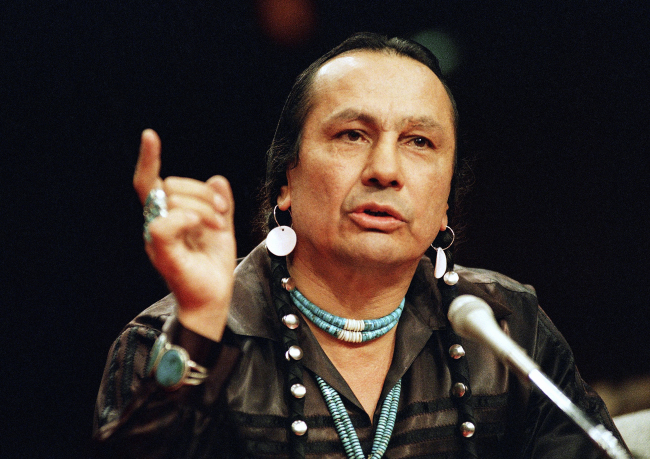 |
Russell Means |
CHICAGO (AFP) ― Sioux activist Russell Means, who helped bring the grievances of Native Americans to national and global attention in the 1970s before becoming a Hollywood actor, died Monday at the age of 72.
“Our dad and husband now walks among our ancestors,” his family wrote in a statement on Means’ website.
A strikingly handsome man with a troubled personal life and a penchant for publicity, Means was an early leader of the American Indian Movement before starring in films such as “Last of the Mohicans.”
In a note two days before his death, Means urged fans to “dedicate yourselves to the work to which I have tried to commit my life: liberation and freedom for my Lakota people, for all indigenous peoples, and, in fact, for ALL peoples.”
Born on South Dakota’s Pine Ridge Reservation in 1939, Means was the eldest son of Hank Means, an Oglala Sioux, and Theodora “Feather” Means, a Yankton Sioux. The family moved to California when he was very young.
He rose to national prominence in the early 1970s by helping stage protests, including a prayer vigil on the heads of presidential statues at Mount Rushmore and a Thanksgiving Day demonstration in which they seized a replica of the Mayflower at Plymouth Rock.
He helped organize a 1972 march on Washington and the takeover of the Bureau of Indian Affairs to bring attention to a century of broken treaties and the struggle for self-determination.
It was the 1973 siege of Wounded Knee which revived the image of Indian warriors and rocketed Means and the movement to the international stage.
The 71-day siege at the site of the last conflict of the American-Indian wars ― where some 350 Lakota men, women and children were killed ― resulted in the death of two activists amid frequent exchanges of fire with federal agents, one of whom was shot and paralyzed.
The protesters aimed to expose corrupt tribal leaders and demand justice and adherence to treaties from the federal government.
Means, who wrote about struggles with drugs and alcohol in his autobiography “Where White Men Fear to Tread,” was acquitted in 1976 of abetting murder during a barroom brawl but spent a year in jail on riot charges for a fight with police outside a Rapid City courthouse.
While the American Indian Movement splintered in the late 1970s over the murder of Annie Mae Aquash, the highest-ranking woman in the group, Means continued his activism.
He travelled to Nicaragua in 1985 and 1986 to meet with Miskito Indians and tried to raise awareness of their struggles against the leftist Sandinista government.
He ran for president in 1988 but lost the Libertarian Party’s nomination to Ron Paul, who mounted a failed bid for the Republican nomination this year.
He began his acting career in 1990 and also had a musical career.
His film credits include the voice of Pocahontas’ father in the hit Disney film, and roles in Oliver Stone’s Natural Born Killers and the John Candy comedy Wagons East.








